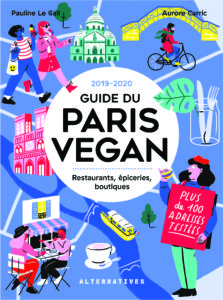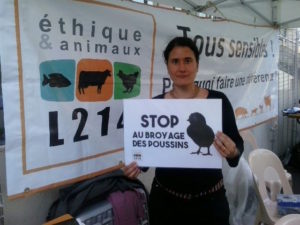Vegans Begin to Stir the Pot in France
Activists, actors and politicians defy tradition and work to prohibit cruelty to animals. Anonymous for the Voiceless, an animal rights organization, holds a peaceful demonstration in Paris. The hand-held signs say "Truth." (Nadya Charvet)
Anonymous for the Voiceless, an animal rights organization, holds a peaceful demonstration in Paris. The hand-held signs say "Truth." (Nadya Charvet)
Truthdig is proud to present this article as part of its Global Voices: Truthdig Women Reporting, a series from a network of female correspondents around the world who are dedicated to pursuing truth within their countries and elsewhere.
PARIS, FRANCE — France has been slow in recognizing the vegan movement, which is not surprising given a renowned culinary tradition notable for fois gras and rich cream sauces. Are we not the country where the gastronomy is classified by UNESCO as a world cultural heritage? Our star chefs are our best ambassadors abroad, our monuments. Who does not know the reputation of Pierre Gagnaire or the late Joël Robuchon?
Until recent years, only a small group of French activists have promoted veganism—a way of life that aims to prohibit killing or abusing animals for use as food, for clothes, in cosmetics testing or for other purposes. Some activists take part in high-profile actions, from attacking butcheries with fake blood to releasing animals from farms and slaughterhouses.
These tactics repel much of French society, but at the same time that society is beginning to embrace the notions of vegan diets and protection of animals. In fact, some of the French media hailed the rise of veganism as the movement of the year 2018—evidence that a campaign pursued most notoriously by militants is well on the way to becoming a social phenomenon.
A Vote for Veganism
The European Parliament election of late May confirmed the rising popularity of the French vegan movement. The Greens (EELV) received nearly 20% of the votes in France, putting the party in a strong third place position. (Among French political forces, the EELV has been a leader in addressing issues such as the treatment of animals.) Even the Animalist Party, which focuses on animal welfare, far exceeded the votes that commentators had predicted for the European Parliament. It obtained more than 2% of the votes in France, outpacing several other small parties.
Previously, the Animalist Party had gotten little attention in the French media, which seemed to consider it marginal and/or dangerous. So the Animalists relied on famous supporters to forward its cause. A few days before the European Parliament vote, dozens of well-known personalities signed a petition calling on voters to protect “the interests of sentient beings.” Signatories included former actress Brigitte Bardot, director/writer Claude Lelouch, actress Laura Smet and actress/writer Anny Duperey.
In addition to the recent vote, veganism is beginning to make headway in many other ways. In Paris, epicenter of the movement, vegetarian and vegan establishments have multiplied and now include gourmet eateries, bakeries and grocery stores. Retail shops offer clothing made without leather, silk and wool, and cosmetics stores sell products that haven’t been tested on animals. Every day, the vegan scene involves more personalities (bloggers, journalists, chefs) and more events such as cooking classes, conferences and film showings.
Festivals promoting veganism and vegetarianism have become major events. VeggieWorld Paris, which takes place twice a year, is a popular consumer fair that features new veggie foods and services. The annual Smmmile Festival combines pop music, vegan cooking classes and other events, and the biannual Paris Vegan Festival puts on conferences, classes and more. A Vegan Christmas Market attracts large crowds with foods such as vegan cheeses and chocolates, as well as cruelty-free cosmetics, vegetarian cookbooks and responsibly made holiday gifts.

The Paris Vegan Guide 2019-2020, which came out in March, contains more than 2,000 vegan restaurants and food purveyors. In the book’s introduction, co-author Pauline Le Gall recalls that 10 years ago being a vegan in Paris was a real challenge. She writes: “Either you had lunch in one of the few vegetarian restaurants concentrated in the 10th district, or you would be satisfied with a plate of fries in a traditional bistro. Most of the time, the servers made you understand … that you were not normal.”
Today, vegetarian and vegan diets have become much more normal. A good example is Le Potager de Charlotte (Charlotte’s Garden), a restaurant in Paris that prides itself on gourmet plant-based cuisine. Two brothers own the restaurant; Adrien Valentin is a naturopath, and David Valentin is a restaurateur. “We really want to break the sad image of veganism,” says David Valentin. You can be epicurean while having convictions. “
Vegan home cooking has also gotten a boost, in large part from books and social media. Sébastien Kardinal, a renowned blogger, has been very successful with “Ma Petite Boucherie Vegan” (“My Small Vegetable Butcher”), a recipe book that shows how to reproduce the taste and texture of meat using vegan ingredients. Kardinal’s aim is to create a healthier and more ethical way of eating.
Veganism has even started to affect the small circle of Michelin star chefs in France. Alain Passard, chef at the three-star Parisian restaurant Arpège, was the first out of the gate. In 2001, he removed red meat from his menu, and he strongly defends a vegetable-based cuisine. (Arpège now serves some meat, although it is well known for its vegetable dishes. It has maintained its three Michelin stars.)
Passard bought three gardens in France, and he hired 10 gardeners to farm them. Every day a truck delivers fresh vegetables, herbs and seasonal fruits from the gardens. Passard says he marvels at the inspiration Mother Nature gives him and says that “the vegetable is the great kitchen of tomorrow.” Passard’s peers voted him chef of the year in 2017, and food critics praise his vision. The website Terroirs de Chefs calls him “the poet of the garden,” and says: “By venturing before anyone else into a vegetable kitchen, Alain Passard has made a bold choice [in a new direction].”
Big Business Joins In
Major French agri-food companies also are playing an active role in the vegan movement. About 1,000 new vegetable-based products come out every year, with this “green market” generating nearly $430 million annually (in U.S. dollars).
Danone, a multinational food company based in Paris (some of its products are branded “Dannon” in the United States), owns Alpro, the second largest dairy- and plant-based brand in Europe. Alpro plans to triple sales of its plant-based products by 2025.
Healthy eating—an adjunct of veganism—has become the new gold standard for big French retailers. Carrefour, which launched a groundbreaking organic line in 1992, made headlines in 2018 with its Act for Food campaign. The company is committed to taking nine key steps, including improving animal welfare, doubling its number of vegetarian offerings and banning 100 controversial substances from its food products.
A Way of Life
Veganism is much more than a dietary choice, according to Elodie Vieille Blanchard, chair of the Vegetarian Association of France, a group that works

to expand access to vegetarian options “[It] encompasses the whole philosophy of a movement refusing animal exploitation,” Vieille Blanchard says. The Vegetarian Association held a conference in May to correspond with the release of Vieille Blanchard’s book, “Révolution Végane” (“Vegan Revolution”).
According to a February poll, 92% of French people think animal welfare is important, and 86% want to prohibit intensive breeding—a practice in which animals are raised to maximize production, regardless of the harm to the animals’ welfare. The poll was an encouraging sign for French vegans. “We [have felt] for a long time that this is a movement of substance that is constantly increasing,” Vieille Blanchard says.
Many vegan activists draw attention to the movement through educational rather than militant means. For example, in late May, members of Anonymous for the Voiceless (AV) held a large demonstration in Paris to support their cause. On its website, AV describes itself as an “animal rights organization that specializes in educating the public on animal exploitation and fostering highly effective activism communities worldwide.”
Asal Alamdari, co-founder of Anonymous for the Voiceless.
AV organized a Cube of Truth, a peaceful static demonstration akin to an art performance. Masked and dressed in black and playing looping videos of animals being abused, the activists invited passersby to engage in conversation. They asked questions such as “Do you know how animals are treated in slaughterhouses?”
A young woman who prefers to remain anonymous joined the AV demonstrators. She had converted to veganism after watching internet videos of animals being slaughtered, and she compares cruelty to animals to other issues facing society. “Injustice, abuse of animals, is also a sign of the [social] violence we are suffering,” she says. “We do not want to be the turkeys [the fall guys] of a political, economic, social farce.”
AV activists came from all over Europe to join the French demonstration. Asal Alamdari and Paul Bashir, the Australian founders of the international group, visited Paris for the occasion.
These kinds of actions are critical to sensitize the public, according to French vegan activist Vincent Aubry. “The action of associations, the dissemination of slaughterhouse [images] have changed the lives of countless people by persuading them that turning off faucets, cycling everywhere and composting at home are not enough,” Aubry says. “This global conversion to veganism is the only way to save the planet.”
Activists in the Crosshairs
Aubry is also the spokesperson for Boucherie Abolition (Butchery Abolition), a group that takes aggressive action to denounce cruelty to animals. For example, on June 8, the organization released a video showing its members entering a rabbit farm, picking up rabbits and releasing them into nearby fields.
Vegan activist Vincent Aubry.
Last September, Aubry made news when he arrived on the set of a television show with the corpse of a little pig, which he said had been found in the garbage can at a pig farm. “We cannot show [this] casually—it is extremely violent,” said Cyril Hanouna, the show’s host. (The pig’s corpse was pictured, although not close up.) Aubry went on to detail the ill treatment the animal had suffered such as surgical castration and removal of the tail. (Tail docking reduces cannibalism among pigs, and castration eliminates the possibility of boar taint, which reduces the quality of pig meat. Both procedures often are done without anesthesia and so are very painful.)
In the past few years, French vegan activists and “antispeciesists” have organized physical actions against butchers and breeders. (Antispeciesists oppose differentiating among species based on the purpose of a species. For example, they say pigs and pet dogs should receive the same treatment because they experience the same pain when they’re abused.)
Militant activists have targeted butcher shops by splashing them with fake blood—water mixed with red dye. The dye is hard to remove, and municipal cleaning teams have to be called in. Some shops also have been stoned, leading French butchers to ask the government for police protection.
The antispeciesist organization 269 Life France issued this slogan on its website and social media accounts: “Go past one or more butcher shops and pour one to two liters of fake blood on the shop window, take a photo and send it to [us].” Activists answered the call: Since January, at least 17 butcheries and slaughterhouses have been attacked.
In May, the owner of an organic meat shop in the Saint-Quentin market in Paris said activists punched him. Two people were taken into custody but have denied the charge. In April, two antispeciesist activists were sent to prison (one for six months; the other for 10 months) for attacking butcher shops and restaurants in northern France.
Some activists also interfere with hunting. In December 2018, activists entered a forest in northeastern France, playing musical instruments to scare animals away from the scene of a hunt. There was no physical confrontation between militants and hunters, but the police were called in to defuse tensions.
The more radical moves have created intense backlash. At the end of May, Minister of Agriculture Didier Guillaume assured the National Assembly (the lower house of parliament) that severe measures would follow.
It is unacceptable “not to respect the rules, to attack the tools of work. No other profession would support it,” he said. “This is no longer possible, and it is even less possible when these actions are made and endorsed by an elected representative of the Republic.” (Guillaume was referring to Bastien Lachaud, a National Assembly deputy who visited a pig farm at night and denounced breeding conditions. The event was videoed and disseminated by Direct Action Everywhere, an international animal rights group.)
The Macron government has stepped up legislation aimed at vegan activists. For example, in April the Senate (the upper house of Parliament) made it a crime to hinder hunting—a crime that may be punished by up to a year in prison and a fine of $US34,000. At the same time, the government reduced the hunting fee by half from about $US440 to $US220.
In May, a large police operation was launched against vegan and antispeciesist activists. At least a dozen members of Boucherie Abolition including Aubry were arrested and face trial. Aubry is willing to face the consequences of his actions, saying, “We need examples to move society forward.”
Vocal Opposition
Those who oppose veganism in France are as vocal and impassioned as the vegan activists themselves. On the website Current Values, columnist Denis Tillinac says the activists are fundamentalists. “Their violence [is] that of Islamists and radicalized feminists in a challenge to our spiritual foundations,” he writes.
Paul Ariès, a political scientist and food historian, is strongly anti-vegan. He feels vegans have bought into a fantasy created by big business. “Veganism matches the economic strategy of the food processing industry,” he says. “Vegans are the fools who will soon buy the fake meat, fake cheese, fake milk that are just about to arrive on the market. … Everything is ready: the patents, the funds, the acceptability. They are already calculating the return on investment! If the vegan movement didn’t exist, the food processing industry would invent it.”
When it comes to the tactics employed by the more radical element of the vegan movement, even vegan supporters are divided. “Activists and antispeciesists are doing a lot of wrong [to the] vegan movement,” says Vieille Blanchard. “Even with [the Vegetarian Association, the militants] are very aggressive, saying that we are traitors to the cause.”
Getting Political
Some vegan activists are going into politics to expand the platform for their views. Douchka Markovic, an early supporter of the animal welfare movement in France, illustrates this trend.
“In 2011, I was very active in the Vegetarian Association of France. Every weekend, I distributed flyers [and] I talked to people to try to convince them [about the vegan movement],” she says. But in 2011, Markovic decided to enter the political realm. “I understood that to counter the meat lobbies, it would have to go up a notch,” she says.

Markovic is now a Green Party representative on the council of the 18th arrondissement (administrative district) of Paris. She is also assistant to the mayor of the 18th arrondissement, and she oversees issues such as sustainable development, food and the environment.
She helped create a national commission that deals with animal welfare and with interactions between humans and other animals in areas such as farming, entertainment, hunting and animal testing. “We were the first political party to have a relationship with the animal issue, and other parties have followed,” she says.
She also has proposed national initiatives—for example, to ban animal testing from scientific research; to abolish hunting with the use of hounds; and to investigate the practices of the slaughterhouse industry.
On June 8, Markovic attended a demonstration in Paris organized by L214, an organization that works to educate the public about animal welfare. More than 1,000 people joined the event, shouting “Enough bloodshed,” “Justice for animals,” and “Three million deaths a day in slaughterhouses … Stop!”
Vegan supporters predict gains for the movement on the local level as well as the national stage. Yannick Jadot is an environmentalist and Green Party member of the European Parliament. In a June interview with Le Monde, Jadot expressed his optimism: “The time has come for the Greens … to win the town halls of several big cities, such as Paris, Nantes, Rennes or Toulouse, during the municipal elections of 2020.”
In late June, an incident took place that demonstrates the growing impact of the vegan movement. The organization L214 published online images of plastic devices surgically inserted into cows’ stomachs at a research facility. These devices, known as portholes, have been used for many years to study cows’ digestion with the goal of maximizing milk production. However, the images had a shocking effect on the public. The incident made news headlines and became a rallying cry supported by Nagui, a prominent radio and television personality. A petition opposing the practice quickly gathered more than 300,000 signatures, according to L214. This emphatic response makes it is clear that vegans are a rising force in France. Their influence is only beginning.
Your support matters…Independent journalism is under threat and overshadowed by heavily funded mainstream media.
You can help level the playing field. Become a member.
Your tax-deductible contribution keeps us digging beneath the headlines to give you thought-provoking, investigative reporting and analysis that unearths what's really happening- without compromise.
Give today to support our courageous, independent journalists.






You need to be a supporter to comment.
There are currently no responses to this article.
Be the first to respond.